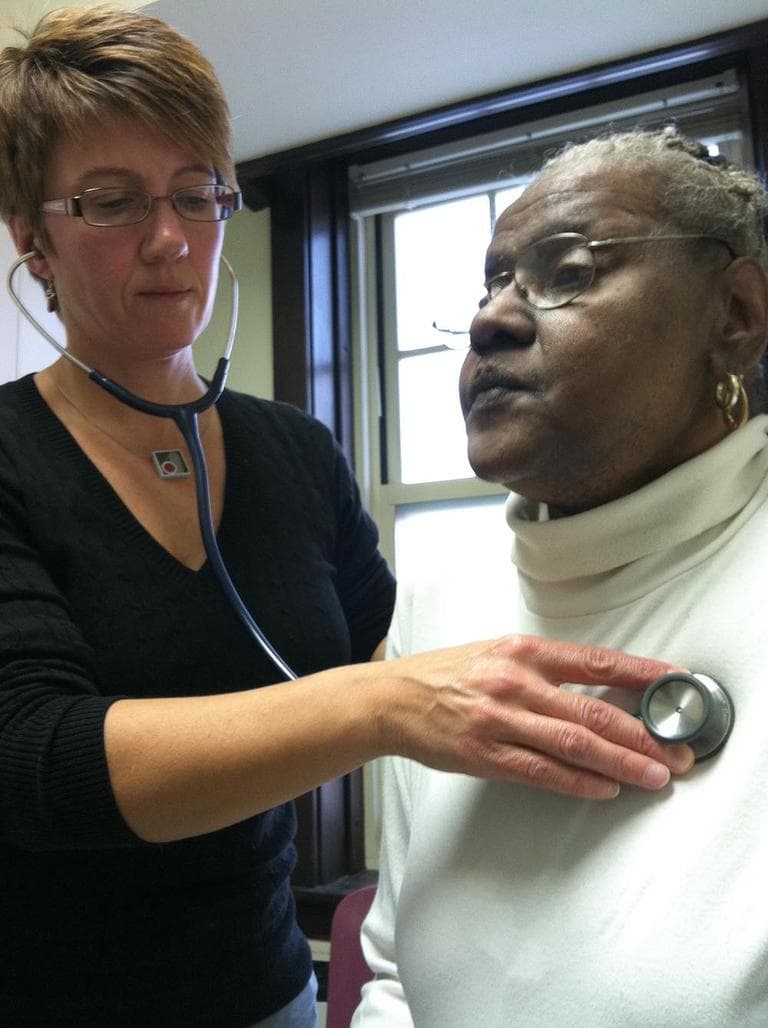Advertisement
Mass. Support Grows For Medical Homes
ResumeDiana Burns sits on an exam table at a community mental health center in Worcester. She wiggles her purple toenails as Joyce Landers, a nurse practitioner, looks on.
“Do you know if you’ve noticed any numbness or tingling in your feet?” Landers asks.
“No,” says Burns, shaking a head of graying coiled cornrows.
“You feel all your toes and it’s nothing unusual?” continues Landers.
"Yeah,” Burns nods slowly.
“Good.”
Landers is pleased. Burns is a new patient for Landers, but Burns is a regular patient at Community Healthlink, a community mental health center in Worcester. The center converted a few offices earlier this year, part of a national pilot project to bring primary care to mental health patients who, like Burns, haven’t had a check-up for years. Burns has just learned she has diabetes.
The idea of established medical homes started with pediatricians in the late 1960s and was adopted by family doctors.
“So I want to give you some medication to help,” Landers pauses as Burns sighs and shakes her head.
Burns already struggles to manage her anxiety and depression.
“I know it is overwhelming, it’s a lot of medication. It’s a serious condition, diabetes, but it is something we can control,” Landers says.
By "we," Landers means a team of nurses and counselors at Community Healthlink who hope to create a so-called 'medical home' for Burns and other patients at this mental health center.
There is growing support in Massachusetts for making sure that every resident has a medical home, one doctor or center that would coordinate all their care. Supporters say this person would prevent duplicate tests, save money and help patients navigate the health care system.
For many of us, our medical home would be our family physician. But what about patients such as Burns, whose main concern is their mental health?
“This is their health care home already,” says Landers who, as a nurse practitioner, can order prescriptions and tests. “They (mental health patients) may show up at a physician’s office or a hospital ER, but these are brief visits and there’s no meaningful contact of continuity of care. In this place they see their therapists on a weekly basis and the psychiatrists, so they’re here a lot.”
Landers says frequent contact with these mental health patients puts her in the best position to manage and coordinate their care.
While many primary care doctors are working to improve the care for mental health patients, the reality is that many are not getting the care they need.

“The mortality rate for people with serious mental illness and addiction is 25 years earlier than the general population,” says Marie Hobart, the chief medical officer at Community Healthlink.
"With any other population that would be considered a public health emergency, but because it’s this population of patients this is kind of a chronic emergency that goes on and on and on, and so we’re really trying to see if we can address that,” Hobart says.
Hobart started this small primary care clinic with a federal grant. Qualifying as a medical home will be important for future funding. As the state moves to setting budgets for patients, your budget would go to the place you name as your medical home.
The idea of established medical homes started with pediatricians in the late 1960s and was adopted by family doctors. These days in Massachusetts, many specialists say they should qualify as a medical home in the case of diabetics who see their endocrinologist on a regular basis or cardiac patients monitored by their cardiologist.
Don Condie, president of the Massachusetts Psychiatric Society, says psychiatrists, not just those who work in a community mental health center, should be considered a medical home in some cases.
“In terms of actually coordinating care, the specialist who might see you more frequently than that primary care doctor makes sense to me as a medical home, at least for some periods of time,” Condie says.
But many primary care doctors say that calling specialists a medical home undermines the whole concept of shifting away from specialized, high-cost care that relies on tests, towards prevention-based primary care.
“I don’t see a cardiologist dealing with abdominal pain. Is the endocrinologist going to treat the runny nose, sore throat, the urinary tract infection?” asks Dr. Richard Dupee.
Dupee heads the largest association of internists in Massachusetts, the American College of Physicians. Dupee says primary care doctors are in the best position to manage all a patients needs and to manage a budget for that care.
“If you’re asking a psychiatrist or cardiologist who doesn’t practice in primary care medicine, to make decisions about what to do, I’m not sure how the flow of funds would work. Not only that, I’m not sure it provides the best type of care,” Dupee said.
Discussions about whom you could name as your primary health care provider are underway at the State House. Legislation defining medical homes as part of a broad plan to control health care spending and improve health care is expected early next year.
We want to know, who would you designate as your medical home? Who is the best person to oversee your care? Who would you trust to manage health care spending for you? Talk to us on Twitter or Facebook on at wbur.org.
This story was produced, in part, as a project for the California Endowment Health Journalism Fellowships, a program of the University of Southern California’s Annenberg School for Communication & Journalism.
This program aired on October 31, 2011.
